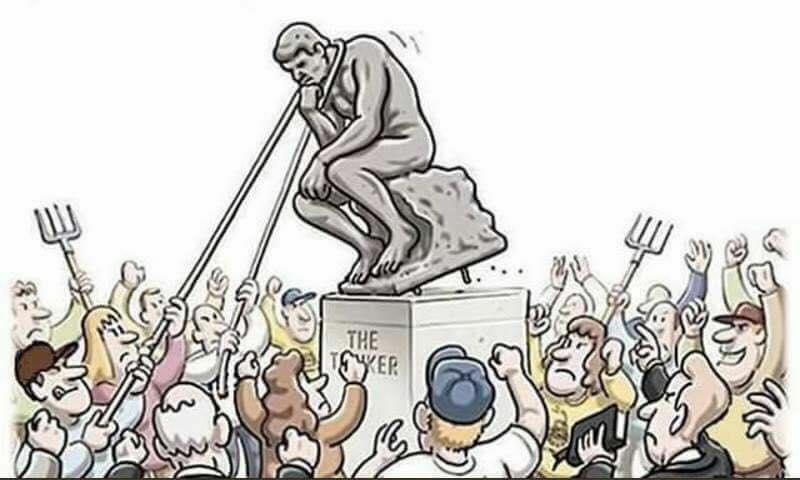Alan Dershowitz: 'Intersectionality' is a code word for anti-Semitism
What do the terrorist group Hamas and the anti-violence group Black Lives Matter have in common? What does the democracy of Israel have in common with the anti-Semitic Ku Klux Klan? What does the Islamic Republic of Iran, which throws gays off rooftops, have in common with gay rights activists? What do feminists have in common with radical Islamic sexists who support the honor killing and genital mutilation of women? Nothing of course. Unless you subscribe to the pseudo-academic concept of intersectionality. Intersectionality — the radical academic theory, which holds that all forms of social oppression are inexorably linked — has become a code word for anti-American, anti-Western, anti-Israel and anti-Semitic bigotry.JPost Editorial: Anyone is a target: Europe has a lot to learn about terrorism
Nowhere has adoption of this radical paradigm been more pronounced than on college campuses where, in the name of "identity politics" and "solidarity," intersectionality has forced artificial coalitions between causes that have nothing to do with each other except a hatred for their fellow students who are "privileged" because they are white, heterosexual, male and especially Jewish.
Students at the University of Illinois recently took to social media to express their distress after flyers were plastered around campus calling for the "end of Jewish privilege." The flyer stated in bold letters that: "ending white privilege starts with ending Jewish privilege." The posters had outlines of silhouettes with Stars of David printed out, and an arrow pointing to them with the accompanying caption "the 1%." Although some of the posters identified Black Lives Matter as sponsors, it is not clear whether they were distributed by extreme right-wing groups using hard-left anti-Semitic tropes or by hard-left anti-Semites. In some respects, it does not really matter because many on the hard-right and hard-left share a disdain for Jews, their nation state and so called "Jewish privilege."
The very concept of "privilege" – the idea that white people benefit from certain privileges in Western society, compared to non-whites living in the same social, political and economic environment – has a long and complex history in the United States. The subjugation of black Americans, and other non-whites, is an endemic problem that requires far-reaching legislative and grassroots action. By attributing this domestic social problem to so-called "Jewish privilege," radicals are engaging in traditional economic anti-Semitism; attributing far-reaching societal problems to Jewish status, occupation or economic performance.
Retired British colonel Richard Kemp, the well-respected former commander of British forces in Afghanistan and a staunch defender of Israel, called Faaborg-Andersen’s statements “chutzpah.” “Not only does Israel have nothing to learn from the EU,” Kemp said, “but the EU is guilty of encouraging terrorism in Israel.”Ben-Dror Yemini: Obama chose dishonor, and Israel will have war
He was apparently referring to the EU’s timid kowtowing to the narrative espoused by Abbas, while ignoring the effects of his ongoing incitement of terrorists, whom he reimburses for their “heroic martyrdom” by paying both them and their families millions of dollars in stipends.
In France the deadly terrorist attack on the Hyper Cacher kosher grocery store in Paris in 2015 sounded the red alert for the country’s Jewish communities and those of its neighbors throughout Europe. Today, security personnel take a more holistic approach, making rounds among Jewish schools and synagogues instead of being permanently stationed in front of them as was previously the case.
The French government’s deployment of soldiers in a more flexible way reflects an attempt to protect more potential targets, which now include virtually every pedestrian, whether in the capital or on the beach in Nice. Perhaps the holistic approach to defense is more democratic, since Jews are no longer the specific target of terrorism in an age where everyone is vulnerable.
As a security expert from the European Jewish Congress told The Jerusalem Post recently, “Today the aim of the attackers is to make as much damage as possible without checking who the people are,” he said, pointing to the recent terrorist attack on Barcelona’s bustling Las Ramblas pedestrian boulevard. “Today if a Jew, Muslim or Christian walks in the street, they can get hit in the same way. Everyone is a target.”
The nuclear agreement—misleadingly presented to the world as the lesser of evils—allowed Iran to grow rich and expand its influence in the region. Now, Tehran is taking over Syria, and the distant enemy is coming closer to Israel.
Iran is taking over Syria. The distant enemy is coming closer. The US is out of the picture. Those who put their trust in the new world sheriff, Donald Trump, have to admit he appears to be far more concerned with the American media than the Iranian imperialism. That is who he is.
The world's sheriff is not whoever has more power—the United States has a lot more—but whoever uses the power he has.
Netanyahu had to go to Vladimir Putin this week again for another round of talks with the Russian leader during his vacation in Sochi. It's not clear whether Putin is going to stop the Iranian threat. It is clear, however, that he's the only one there is any point in talking to.ISIS has been defeated on the ground. Over the last year, its fighters have been pushed out of Mosul in Iraq, and in the coming year, probably, they'll also be pushed out of Syria's Raqqa, the caliphate's capital. The problem is that the alternative for ISIS on the ground—Iran and Hezbollah—is just as bad.






























